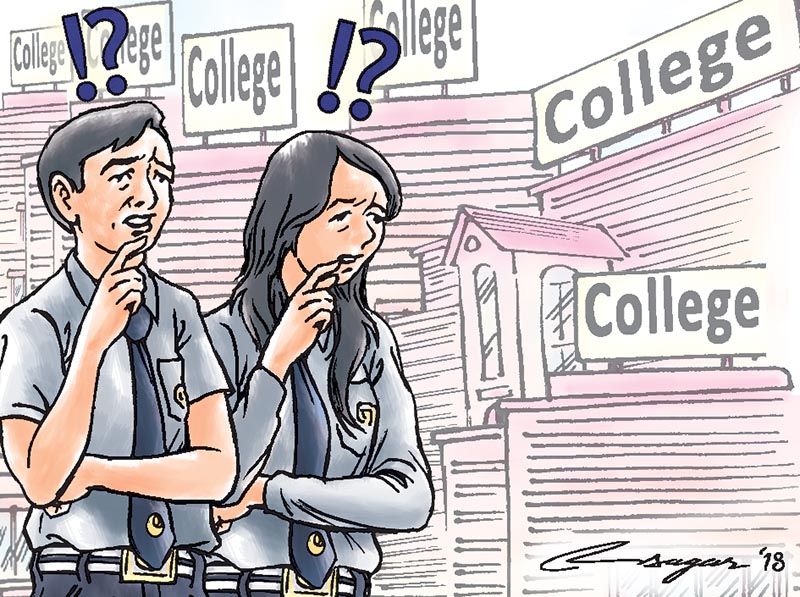At sea after SEE: Choose stream wisely
Students should list best possible careers they can achieve from the courses they pursue. Selecting stream should not be for parents, friends or others; rather it should be for one’s own future career and life passion
Results of the nationally administered Secondary Education Examination (SEE) 2074 were published in the last week of June. Under the letter grading system, which was adopted three years ago, none “failed” the exam. However, there are some students who are not qualified to enrol themselves for Grade XI for failing to obtain the required grade point average.
SEE is a new system applicable for Grade X students, and this was adopted after replacing the School Leaving Certificate (SLC) exam, which was often termed the Iron Gate, for from here on doors for higher studies used to open earlier.
For those who are eligible for admission in Grade XI, this is the moment of truth. This is the time when students have to make a choice of what they want to study and where they should study. There may have been rigorous discussions when it comes to making SEE a successful system, but there seems to be a lack of orientation about the post-SEE academic journey of students.
After SEE results, students hence are often at sea.
There is a general tendency among us that students with better grades should pursue science. Other streams are preposterously placed for middle or lower grade holders. Earlier also when SLC exams were conducted, there used to be “board toppers” and in almost all cases, those on the list of toppers would opt for science stream. It is not that there were no exceptions, but such examples were few and far between.
Now with the SEE results out, those with good grades are likely to study science in Grade XI. Colleges also often fail to counsel students in a proper way.
In America and European countries, more than 60 per cent merited students enrol in management stream. In Australia, students in huge numbers opt for fashion designing. In leading Asian countries, the most powerful foundation for all branches of human knowledge is humanities. There is a growing attraction towards tourism in Africa.
But in Nepal students are often forced to study a particular subject on the basis of the grades they have obtained, ignoring what they want to study.
Many students seem to have partial or minimal information about prospects of streams they want to study.
The general perception is: study science and become a doctor or an engineer; choose management to become a manger; join humanities to work in the government sector, and study education and become a teacher. These are conventionally constructed faulty assumptions.
Every discipline offers countless opportunities.
“The Career Counselor’s Handbook” by Howard E Figler and “Career Match” by Shoya Zichy and Ann Bidou can be very good self-help tools when it comes to choosing which discipline to follow while pursuing higher studies. If maximum possibilities are known to students, the degree of ease for a better choice is higher.
Everyone is unique and different, and everyone aspires to be professionally successful post-studies. But for students to be successful in their careers in later years, a solid ground has to be set now.
Students in Nepal are oftentimes influenced by various factors – parental pressure, colleges and their infrastructure, fee structures, probable scholarships. And they tend to get so distracted in the din that they forget what they actually want to study or do in future. In such situations, a student is likely to get attracted towards a college which has a swimming pool rather than towards a school which has a library or laboratory. This can make a huge difference.
Any stream can lead students to the envious height of professional success.
Rather than stratifying education streams into good or bad groups, we have to change the approach starting with what students want and what their innate qualities are.
For a student who is good at mathematical calculations, science could be a better option, while someone who is good in language may excel in humanities. And both can be equally successful in life. John Holland’s psychological division of people is crucial to assimilate this.
The 3D tests and personality tests may be best methods to tally and adjudicate this suitability. These tests explore students’ nature and sort better academic matches. Students’ psychological test, skill test, aptitude and attitude tests and recently developed parametric pragmatic test can additionally guide where someone deserves.
“Choose a Career and Discover Your Perfect Job” by Vurnum and Merlevede and “Career Counseling: A Holistic Approach” by Vernon Zunker are instrumental guides in this regard.
Thus, students have to list best possible careers they can achieve from the courses they pursue. They should fix the ideal profession they love to grow themselves in. They need to try to find a match between their own nature, possible career choice and capability and prioritise the best discipline. Better it is to set up a role-model in the profession the students want to pursue in future. Selecting stream should not be for parents, friends or others; rather it should be for one’s own aim, vision, future career and life passion. Seniors should orient and drill them accordingly than suggesting any fixed course.
Dhakal is associate professor at Kathmandu School of Law






